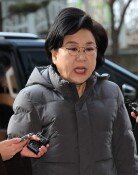Koreans Give F to Welfare Policies
Koreans Give F to Welfare Policies
Posted May. 25, 2007 03:12,
Seven out of every ten Koreans are discontent with the Roh Administrations unemployment policies and poverty measures.
Koreans are more sensitive and negative about the income gap between the rich and the poor than their counterparts in advanced countries, including Americans, French, and Japanese.
This newspaper analyzed a report titled The Vision and Strategy of a Sustainable Korean Welfare State written by Seoul National University social welfare Professor Ahn Sang-hoon and his team.
At the request of the Ministry of Health and Welfare, the team led by Professor Ahn wrote a report based on a survey of 1,200 Korean men and women at the end of last year and turned in the report to the ministry recently.
The report showed that 77.2 percent of respondents replied negatively to the question of unemployment policies; 49.8 percent answered the government is doing badly, followed by 27.4 percent who said, very badly. Meanwhile, 5.4 percent said it is doing well and only 0.5 percent said very well.
To the poverty prevention and reduction policies, 69.5 percent answered negatively; 51.4 percent said the government is doing badly, and 18.1 percent said very badly.
Moreover, 56.0 percent and 50.0 percent were negative to the current housing policies and education policies, respectively, showing the publics dissatisfaction with overall welfare policies.
Professor Ahn and his teams analysis of the awareness of social welfare policies showed Koreans are more negative toward the income gap issue than the people of eight other advanced countries: the U.S., Japan, the U.K., France, Germany, Sweden, and Norway.
To the question whether the income gap is needed for the development and prosperity (of a society), Koreans scored the highest with 3.51 points next to the French (3.71 points) on a scale of 1 to 5, with 1 being strong agreement. However, Americans (3.19 points) and Germans (3.22 points) accepted the necessity of the gap more so than Koreans.
On a scale of 1 to 5 with 1 being strong agreement, Koreans scored the lowest with 1.51 points on the question of whether there is a huge income gap at present. The average score of the 8 advanced countries was 2.08.
The research showed that welfare policies are not satisfactory overall. To tackle the problem, the government should find ways to provide welfare benefits for the middle class that pay most of the nations taxes as well as those of the marginalized underclass in the long run, said Professor Ahn.
achim@donga.com sanjuck@donga.com







